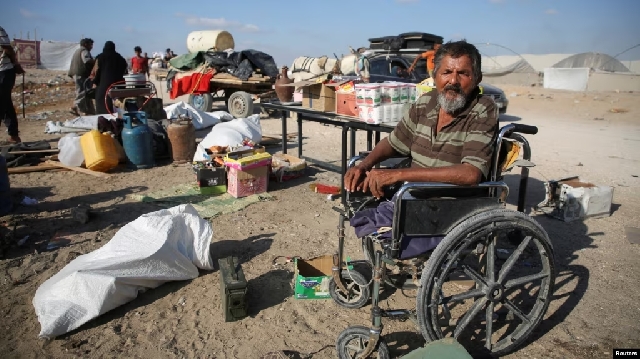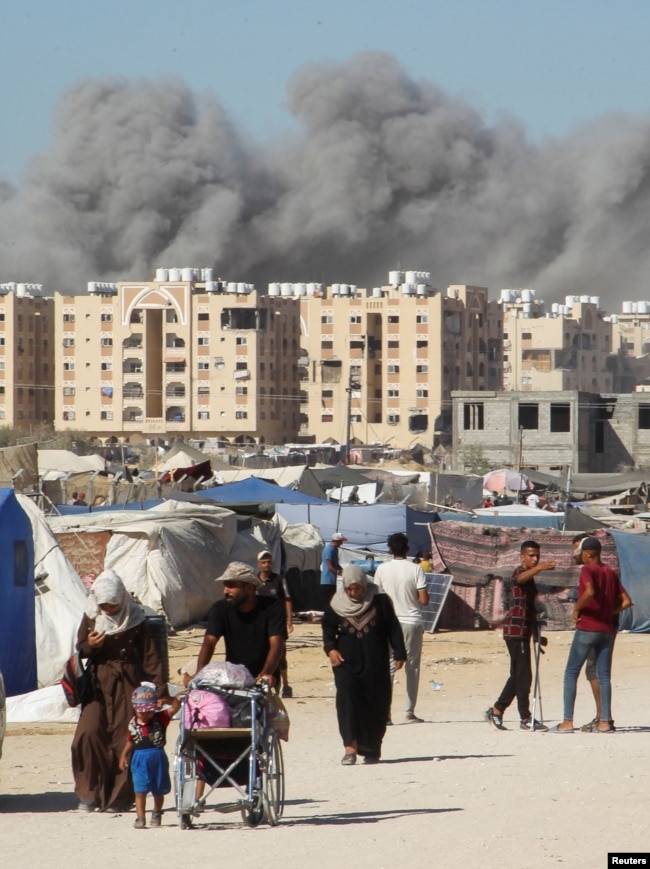Gaza cease-fire mediators announce new plan
 Displaced Palestinians make their way as they flee Hamad City following an Israeli evacuation order, in Khan Younis in the southern Gaza Strip, Aug. 16, 2024
Displaced Palestinians make their way as they flee Hamad City following an Israeli evacuation order, in Khan Younis in the southern Gaza Strip, Aug. 16, 2024
International mediators working on a cease-fire and hostage release agreement between Israel and Hamas announced Friday they have presented both parties with a “bridging proposal” that builds on previous areas of agreement and closes remaining gaps to allow for swift implementation of the plan.
After wrapping up a two-day meeting in Doha, meditators from the United States, Egypt and Qatar issued a joint statement, saying their talks had been intensive, serious, constructive and conducted in a positive atmosphere.
They said working teams would meet again next week to iron out details of implementing the proposal, including arrangements for the release of all hostages and detainees and humanitarian provisions.
The statement said senior officials from the mediators’ governments would reconvene in Cairo before the end of next week to conclude the deal under the terms put forward Friday.
 | Smoke rises following an Israeli strike on a residential building in Khan Younis, in the southern Gaza Strip, on Aug. 16, 2024
| Smoke rises following an Israeli strike on a residential building in Khan Younis, in the southern Gaza Strip, on Aug. 16, 2024
U.S. Secretary of State Antony Blinken will leave for Israel on Saturday to "continue intensive diplomatic efforts” to reach a cease-fire agreement, State Department spokesperson Vedant Patel said.
A senior Biden administration official said the latest negotiations in Doha were the most productive in months.
The official, who spoke to reporters on condition of anonymity, said mediators were preparing for the implementation of a possible deal but did not give further details.
"It was consensus of all of the participants here over the past 48 hours that there's really a new spirit here to drive it to a conclusion," the official said.
President Joe Biden also expressed optimism, telling reporters in Washington "we may have something" but adding that "we're not there yet."
He later issued a statement saying he had received an update from his negotiating team in Doha and directed them to put forward the comprehensive bridging proposal.
"I spoke separately with Amir Sheikh Tamim [of Qatar] and President [Abdel Fattah el-] Sissi [of Egypt] to review the significant progress made in Doha over the past two days of talks, and they expressed the strong support of Qatar and Egypt for the U.S. proposal as co-mediators in this process," Biden said in the statement.
He said the negotiating teams would remain in Doha and continue to work.
He ended by saying Blinken would "reaffirm my ironclad support for Israel's security, continue our intensive efforts to conclude this agreement and to underscore that with the comprehensive cease-fire and hostage release deal now in sight, no one in the region should take actions to undermine this process."
Gerald Feierstein, director of the Arabian Peninsula program at the Washington-based Middle East Institute, told VOA that whether a deal goes through will depend on what both sides believe they will get out of it.
"The key is whether the Israelis and Hamas believe that they will get more from reaching a cease-fire agreement than they will from continuing the conflict. And up until now, what we've seen is that both sides have seen that their interests rest in continuing the fighting."
Hamas cast doubt Friday that it would agree to the latest proposal, saying it diverged significantly from the previous version it had agreed to. The militant group was not directly involved in the latest round of talks but was kept briefed on the developments.
Shortly after the conclusion of the meeting in Doha, Israeli Prime Minister Benjamin Netanyahu’s office issued a statement saying Israel appreciates the efforts of the mediators “to dissuade Hamas from its refusal to agree to a deal for the release of the hostages.”
The statement went on to say, “Israel's core principles are well known to the mediators and to the United States, and Israel hopes that their pressure will lead Hamas to accept the May 27 principles, in order for the details of the agreement to be implemented.”
Regional instability
Also on Friday, U.S. Defense Secretary Lloyd Austin spoke with Israeli Minister of Defense Yoav Gallant on the situation in Gaza as well the conflict between Israel and Hezbollah leaders in Lebanon.
In a U.S. Defense Department readout on the meeting, the department said the two discussed regional instability and the growing risk of escalation from Iran, Lebanese Hezbollah and Iran-backed terrorist groups across the Middle East.
Austin told Galant the United States is continuing to monitor attack planning from Iran and its proxies and is well-postured across the region to defend Israel and protect U.S. personnel and facilities. The two also discussed progress on the cease-fire talks.
That meeting came as the Israeli army on Friday ordered people in south and central Gaza to evacuate areas previously designated humanitarian safe zones, saying Hamas had used the areas to fire mortars and rockets at Israel.
In a statement posted to social media, Israel Defense Forces, or IDF, said, "Due to significant acts of terrorism, the exploitation of the Humanitarian Area for terrorist activities, and the firing of rockets and mortars toward the State of Israel in the north of Khan Yunis, remaining in this area has become dangerous. Therefore, at this time the Humanitarian Area will be adjusted.”
The IDF said the residents of those areas were notified of the evacuations through flyers, email and text messages, recorded phone messages and Arabic broadcasts.
Hamas militants killed about 1,200 people and captured about 250 hostages in their October 7 terror attack on Israel that sparked the war. Israel says it believes Hamas is still holding 116 hostages, including 42 that the military says are dead.
Israel has since responded with an air and land assault on Hamas-governed Gaza, which both sides agree has killed more than 39,400 people. Israel says the majority of the dead are combatants. The Hamas-run Health Ministry says 40,000 have died, the majority of them women and children, but it does not estimate how many of the dead were combatants.
Nearly three-quarters of Gaza's 2.3 million population is displaced, and nearly the entire population is at risk of famine, according to the United Nations.
Kim Lewis and Celia Mendoza contributed to this report. Some information came from The Associated Press and Reuters.
Source: voanews.com
Trending World

About 200 West African soldiers in Benin for 'clean-up' after failed coup
15:58
Ethiopia arrests nine TikTok creators in social media crackdown
15:56
Germany accuses Russia of 2024 cyber-attack and disinformation
15:50
Russia hits back at Europe's big plan to loan Moscow's frozen cash to Ukraine
15:48
Reddit launches High Court challenge to Australia's social media ban for kids
11:30
Five arrested over plot to attack German Christmas market
14:05
Dozens killed in Morocco flash floods
15:29
Ugandan army admits holding priest who'd been missing for days
15:27
US designates Colombian cocaine gang a terrorist group
22:08
EU waters down plans to end new petrol and diesel car sales by 2035
22:05



